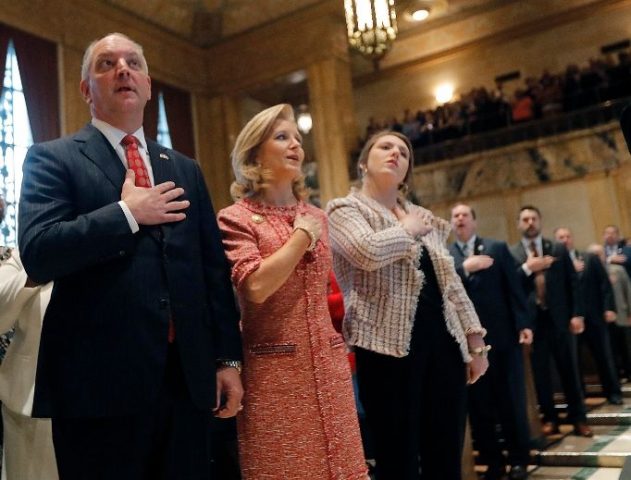Contrasting New Laws in Louisiana and Illinois Highlight States’ Abortion Divide

Saint of the Day for June 5: St. Boniface (c. 675 – June 5, 754)
June 5, 2019
CNA: DiNardo Accused of Mishandling Clerical Sexual Misconduct Case
June 5, 2019
Louisiana Gov. John Bel Edwards holds his hand to his heart, along with his wife, Donna Edwards, and their daughter Sarah Ellen Edwards, right, during the pledge of allegiance at the opening of the annual state legislative session in Baton Rouge on April 8. Nearly three decades ago, when Mrs. Edwards was 20 weeks pregnant with their first child, a doctor discovered their daughter had spina bifida and encouraged an abortion. The Edwardses refused. Edwards, who has repeatedly bucked national party leaders on abortion rights, signed legislation that would ban the procedure as early as six weeks of pregnancy. (AP photo/Gerald Herbert, Pool, File)
Louisiana Gov. John Bel Edwards says signing a pro-life measure is ‘what my Catholic Christian faith requires,’ but Illinois Gov. J.B. Pritzker counters that his own state is ‘making history’ with its pro-abortion legislation.
By Lauretta Brown, National Catholic Register, June 4, 2019
WASHINGTON — Two Democratic governors, John Bel Edwards and J.B. Pritzker, exemplify the growing divide in the abortion debate as they recently backed measures, one to restrict and the other to expand abortion access.
Louisiana Gov. Edwards stands out as a striking exception to the pro-abortion advocacy of his party.
As the only pro-life Democratic governor in the South, he signed a heartbeat bill in his state despite immense pressure from his party nationally to do otherwise. The Louisiana measure bans abortion when a fetal heartbeat is detected — which can be as early as six weeks into pregnancy, before some women even know they’re pregnant.
“It’s consistent with my unblemished pro-life record in my years as a legislator and governor,” Edwards said of the bill. Edwards’ office referred the Register to statements he made on his monthly radio program about being a pro-life Democrat.
“That’s the way I was raised. That’s what my Catholic Christian faith requires,” he explained. “I know that for many in the national party, on the national scene, that’s not a good fit. But I will tell you, here in Louisiana, I speak and meet with Democrats who are pro-life every single day.”
In contrast, Democratic Illinois Gov. Pritzker announced that he would sign an extreme late-term abortion measure that was passed by the Illinois Senate late on May 31. It would not only enshrine a “fundamental right” to abortion into law, but it would remove “regulations for abortion clinics, required waiting periods to obtain an abortion, and a ban on partial-birth abortion … it would lift criminal penalties for performing abortions, remove conscience protections for health care personnel who object to abortion, and prevent further state regulation of abortion.”
Pritzker tweeted that “with reproductive health care under attack across the country, we must do everything in our power to protect women’s rights in Illinois.”
And in a statement after the bill passed in the Illinois House, he referenced it in the specific context of the pro-life measures legislated recently in other states, including Louisiana. “Illinois is making history, because our state will now be the most progressive in the nation for reproductive health care,” Pritzker said. “In Illinois, we trust women to make the most personal and fundamental decisions of their lives — and now, that will be the law of the land, even as it’s under threat in other states.”
The Catholic bishops of Illinois bishops have issued a statement denouncing the measure, pointing out that the bill “dramatically rewrites current abortion law, going further than Roe v. Wade in stripping human rights and dignity from the unborn child with this single statement: ‘A fertilized egg, embryo, or fetus does not have independent rights under the laws of this state.’”
Democratic Party’s Abortion Orthodoxy
The Illinois governor’s push for late-term, unrestricted abortion is in line with the views of the Democratic Party, which has been increasingly critical of pro-life Democrats like Gov. Edwards.
The 2020 Democratic candidates have doubled down on the party’s support for unrestricted, taxpayer-funded abortions up through the third trimester of pregnancy. Sen. Kirsten Gillibrand, D-N.Y., went after Gov. Edwards in a tweet after he signed the heartbeat bill, claiming that he was “turning his back on Louisiana women by signing this shameful bill.”
Additionally, the Democratic Congressional Campaign Committee chairwoman, Rep. Cheri Bustos, recently backed out of fundraising for her Illinois colleague Rep. Dan Lipinski, one of the last staunch pro-life Democrats in Congress, amid arguments from some in the party who argue that you can’t be a Democrat if you’re against abortion.
Maureen Ferguson, a senior policy adviser for The Catholic Association, told the Register that there’s “definitely a growing intolerance of pro-life Democrats within the Democratic Party,” pointing to the party’s “dramatic shift” on taxpayer funding of abortion.
“With Obamacare you had about 25% of Democrats voting for an amendment to take abortion out of Obamacare so that no one would be forced to fund it,” she pointed out. “Now in the House you’re down to one, two or three pro-life Democrats who are willing to vote that way.”
Supreme Court’s Caution
Both the Louisiana and Illinois measures come as states react to a Supreme Court whose overall stance on the pro-life cause remains unclear.
Much of the impetus for passing such laws has stemmed from a widespread belief, on both sides of the abortion debate, that the Supreme Court might be moving toward a reconsideration of the landmark 1973 Roe v. Wade decision that legalized abortion nationally. But the court has been sending mixed signals despite the perception that recently appointed Justices Brett Kavanaugh and Neil Gorsuch would be more friendly to pro-life legislation.
The court recently declined to take up consideration of an Indiana law that would have banned abortion based on disability, sex or race. They did permit another portion of that measure to stand that required burials for the remains of unborn babies killed in abortions.
Rachel Morrison, Americans United for Life’s litigation counsel, said in a statement that without laws like Indiana’s fetal-remains law, “medical providers are free to dispose of human fetal remains by incineration with medical waste, by dumping in landfills, and even by burning the remains to generate energy. Indiana’s law recognizes the simple biological fact that human fetuses are human beings and, as such, should be treated with humanity and dignity, whether in life or in death.”
While some in the pro-life movement viewed the court’s upholding of the burial law as a positive step, its punting on the question of discriminatory abortions is part of a larger trend they have had this term: of attempting to avoid the abortion issue.
In his concurrent opinion May 28, Justice Clarence Thomas laid out statistics illustrating that “a growing body of evidence suggests that eugenic goals are already being realized through abortion.” These included the high global abortion rates following a prenatal diagnosis of Down syndrome. He wrote that the Indiana law would have supported “a state’s compelling interest in preventing abortion from becoming a tool of modern-day eugenics.”
“Although the court declines to wade into these issues today, we cannot avoid them forever,” he warned.
Thomas implied in another case in December that the court’s rejection of an appeal from states trying to defund Planned Parenthood had to do with a desire to avoid abortion cases. Justices Thomas, Samuel Alito and Gorsuch dissented from that decision, while Chief Justice John Roberts and Justice Kavanaugh sided with the other justices in choosing not to take up the case.
“What explains the court’s refusal to do its job here?” Justice Thomas asked. “I suspect it has something to do with the fact that some respondents in these cases are named ‘Planned Parenthood.’ That makes the court’s decision particularly troubling, as the question presented has nothing to do with abortion.”
Tom Shakely, chief engagement officer at Americans United for Life, told the Register that the court’s mixed ruling on the Indiana law may signal a prudent and methodical approach to the abortion debate.
“As the Supreme Court’s Box v. Planned Parenthood ruling confirms, we are witnessing the Roberts Court take an incremental approach to overturning the abortion regime that seven men imposed on America overnight with Roe v. Wade,” he contended. “What SCOTUS is doing is soberly and methodically turning back to a jurisprudence rooted in the Constitution, and that is something every pro-life American can celebrate, because in that approach, a clear end to the practice of abortion is in sight.”
Ferguson also told the Register that it “certainly seems as though the court is signaling that they’re going to move slowly on this, in terms of taking another look at the constitutionality of abortion.”
Other States’ Efforts
While the Supreme Court has been wary of the issue, some states are following the lead of Illinois and New York on late-term abortion. New York passed its Reproductive Health Act in January, which allows late-term abortion up until birth. Democratic New York Gov. Andrew Cuomo lit the One World Trade Center and other landmarks pink to celebrate the abortion measure’s passage.
Vermont is weighing a similar measure to allow late-term abortion. Bishop Christopher Coyne of Burlington warned that the Vermont measure would mean “that a baby in the womb can be terminated right up to the moment of natural birth.” Massachusetts is also considering a bill to permit late-term abortion.
Meanwhile, pro-life states are attempting measures to outlaw abortion at earlier stages in the pregnancy. Recently passed legislation in Alabama would make it a felony to perform an abortion at any stage. The state hopes that the measure will prompt the Supreme Court to revisit its precedent-setting Roe v. Wade and Planned Parenthood v. Casey decisions. A swath of other states are promoting heartbeat bills.
Jeanne Mancini, president of the March for Life, told the Register that pro-life measures in these states could partly be responding to the late-term abortion push on the other side.
“Earlier this year we saw an extreme pro-abortion bill in New York enacted as well as a bill introduced in Virginia that would allow abortion until birth, paid for by tax dollars,” she said. “In part, I believe some of these heartbeat bills are a reaction to such abortion extremism. I also believe that a broad shift in public opinion about the human-rights abuse of abortion is underlying some pro-life bills.”
Ferguson attributed the measures to “speculation about the Supreme Court” reconsidering Roe v. Wade. “So many states are responding to that,” she said. “So you have all these extreme laws being pushed in New York, Virginia, Rhode Island, Vermont, Illinois … and then pro-life states are pushing all sorts of 20-week bans, 18-week bans, six-week bans.”
“The states are the laboratories of democracy,” Ferguson added. “People are speaking up, and democracy is a messy process. And I think we’re seeing a lot of that in action.”
Different Approaches
Some pro-life states favor an incremental challenge to abortion with 15-, 18- and 20-week bans. Seventeen states already ban abortion after 20 weeks of pregnancy — the point at which a growing body of scientific evidence says the unborn baby can feel pain.
There is some debate within the pro-life movement as to whether a more incremental approach is better than measures like the Alabama bill and heartbeat bills. Several prominent Republicans have called the Alabama measure too extreme due in part to its lack of exceptions for rape and incest.
In Tennessee, Bishop Richard Stika of the Diocese of Knoxville and Bishop J. Mark Spalding of the Diocese of Nashville wrote of prudential concerns with that stat’es heartbeat bill, explaining that such measures have been unsuccessful up to this point, resulting in costly legal fees to Planned Parenthood and potentially strengthening Roe v. Wade’s precedent. All of the current heartbeat laws are either being challenged in court or are expected to be.
Ferguson called the disagreement over the two approaches “a very difficult strategic question.” She said that since the beginning of the pro-life movement, “there have been disagreements like this about how quickly to move — and is it justified to have laws that are more incremental in approach because over the long term, perhaps, that might be a better or wiser strategy in terms of seeking legal protection of unborn children?”
Attacks From Hollywood
More controversial pro-life legislation in the states has led to some backlash from abortion advocates in Hollywood, which has included boycott threats.
Actor Jim Carrey drew a disturbing cartoon of Alabama’s pro-life Gov. Kay Ivey after she signed the state’s pro-life measure. The image depicted Ivey as an unborn baby in the process of being aborted.
Many celebrities individually voiced their anger over Georgia’s heartbeat bill and Alabama’s abortion ban. Actress Anne Hathaway accused white women, specifically Ivey and the measure’s sponsor, state Rep. Terri Collins, R-Decatur, of “complicity” in the Alabama bill that she claimed would lead to the deaths of women. Actresses Jessica Chastain and Sophie Turner signed a letter refusing to work in states with anti-abortion measures.
The heartbeat measure in Georgia has several prominent Hollywood studios threatening to boycott the state, and Netflix has also threatened to “rethink” its investment in the state over the bill and even said it would help fight the law in court. Disney said it would be “very difficult” to film in Georgia if the bill was enacted as planned in January 2020. Democratic presidential hopeful Rep. Eric Swalwell of California even said CNN should consider moving its headquarters in Atlanta because of the state’s pro-life law.
The boycott threats are thought to be unlikely to materialize, as the Alabama and Georgia laws will be challenged in the courts before they go into effect.
Pro-Life Response
Netflix’s threatened boycott of Georgia has actually resulted in a pro-life boycott of the company. A petition to “Dump Netflix” over its support of abortion has more than 15,000 signatures, and many pro-life advocates have announced that they are canceling their Netflix subscriptions over the issue.
Mancini stressed that in response to boycotts and hostility from the pro-abortion side that it’s important to engage with civility.
“I’m a firm believer of being pro-life in our actions, being loving, recognizing and respecting the human dignity of the person disagreeing with you, praying for conversion of heart, and at the same time never wavering on what is real, true and good,” she said. “Hearts and minds are won by the beauty, truth and attractiveness of life.”
Lauretta Brown is the Register’s Washington-based staff writer.




